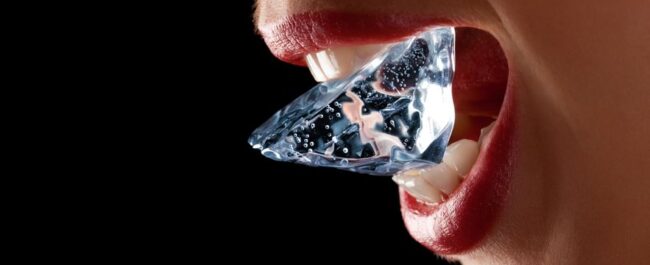Is Chewing Ice Bad for Teeth? My Child is Constantly Doing It!
The fast and easy answer is simply, YES, chewing ice can be bad for your teeth. Ice is a hard substance, and when you chew on it, you expose your teeth to potential damage. We will get to why chewing on ice is harmful, yet first lets look at why someone would even want or get into chewing on it!
At Reflections-Dental Oakville, our dentists routinely get questions about oral health that range across the spectrum – including ice chewing! Ask us anything related to your oral care and health.
Chewing ice, particularly among children, can be driven by a few factors:
- Texture and Sensory Stimulation: Some people, including children, enjoy the crunching sensation and the cold feeling that chewing ice provides. It can be a satisfying sensory experience for them.
- Cooling and Refreshing: Chewing ice may be perceived as a way to cool down or refresh the mouth, especially during hot weather or when feeling thirsty. The cold temperature can provide a temporary sense of relief.
- Habitual Behavior: Chewing ice can become a habit for some individuals, including children. They may have started chewing ice without any particular reason and continued doing so over time. It can be a subconscious or automatic behavior.
- Nutrient Deficiencies: In some cases, craving and chewing ice (a condition called pagophagia) can be associated with iron deficiency anemia. This is more common in certain groups, such as children, adolescents, and pregnant women. Chewing ice may temporarily alleviate some symptoms, but addressing the underlying nutrient deficiency is important.
While chewing ice may be appealing to some, the risks and negative effects on dental health outweigh any benefits. If you or your child have a habit of chewing on ice, talk to your dentist for advise and seek root causes.
Damage caused by chewing ice
- Tooth Fractures: Chewing on hard substances like ice puts significant stress on your teeth, increasing the risk of tooth fractures. Biting down on a hard piece of ice can cause a crack or chip in your tooth enamel, leading to pain, sensitivity, and potential dental problems.
- Tooth Sensitivity: Chewing ice can wear down the protective enamel layer of your teeth. As the enamel thins, your teeth may become more sensitive to hot and cold temperatures, making eating and drinking uncomfortable.
- Dental Fillings and Restorations: If you have dental fillings, crowns, or other dental restorations, chewing ice can also pose a risk. The extreme temperature changes caused by chewing ice can potentially damage or loosen these restorations, leading to the need for repairs or replacements.
- Irritated Gums: Chewing on hard ice cubes can irritate your gums and cause them to become inflamed. This can lead to gum sensitivity, bleeding, and potential gum disease if not addressed.
- Jaw Problems: Constantly crunching on hard ice can strain your jaw joints and muscles, leading to jaw pain, headaches, and even temporomandibular joint disorder (TMJ).
Chewing ice can be particularly harmful to children for a few reasons:
- Vulnerable Teeth: Children’s teeth are still developing and are generally softer and more vulnerable than adult teeth. The enamel, which is the protective outer layer of the teeth, may not be as strong in children, making them more susceptible to damage from chewing on hard substances like ice.
- Thinner Enamel: Children’s teeth tend to have thinner enamel compared to adult teeth. Thinning enamel increases the risk of tooth sensitivity and makes the teeth more prone to damage from chewing on ice.
- Braces or Orthodontic Appliances: Many children and teenagers undergo orthodontic treatment with braces or other appliances. Chewing on ice can pose an even greater risk for those with braces, as the pressure and force exerted while biting on ice can damage the brackets or wires, leading to costly repairs and extended treatment time.
- Limited Dental Hygiene Awareness: Children may not have developed a strong dental hygiene routine or be fully aware of the consequences of chewing ice on their teeth. They may be more likely to engage in habits like chewing ice without understanding the potential risks and long-term consequences.
Protecting teeth and overall health, particularly in children, is vital and ice chewing may be a sign of a greater health issue under the surface. Before damage is caused to teeth themselves and to address any other health concerns, seek out the advice of your dentist. Get informed, get help and live healthy!


